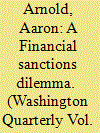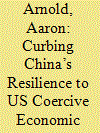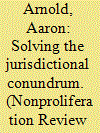|
|
|
Sort Order |
|
|
|
Items / Page
|
|
|
|
|
|
|
| Srl | Item |
| 1 |
ID:
170913


|
|
|
| 2 |
ID:
190379


|
|
|
|
|
| Summary/Abstract |
It has been a year since Russia’s invasion of Ukraine and the West’s subsequent response with coordinated financial and economic sanctions. It was not only Moscow, however, that was caught off-guard by Washington’s unprecedented speed at leveraging not only its own sanctions regime, but also coordinating with its partners and allies. Beijing, too, was equally unnerved by how quickly and how extensively the sanctions regime against Russia unfolded. What lessons, then, might China take away from US-led sanctions against Russia? Can China feasibly fortify its financial and economic system against the potential for a large-scale, coordinated sanctions effort?
|
|
|
|
|
|
|
|
|
|
|
|
|
|
|
|
| 3 |
ID:
168438


|
|
|
|
|
| Summary/Abstract |
In 2004, the United Nations Security Council adopted resolution 1540, which acknowledged the non-state acquisition of weapons of mass destruction as a security threat and called on member states to implement “appropriate effective” domestic trade controls. The United States, however, has both promoted the multilateral implementation of strategic trade controls but has also increasingly resorted to extraterritorial enforcement of its counterproliferation rules. How can a multilateral, norms-based international regime like 1540 contend with extraterritorial enforcement based on national interests? We argue that increased U.S. extraterritorial counterproliferation policies are a consequence of the inconsistent implementation of resolution 1540, adaptive and resilient proliferation networks, and a history of expanding legal interpretations of jurisdiction. We find that while U.S. extraterritorial enforcement can effectively disrupt networks hiding in overseas jurisdictions, doing so creates disincentives for states to implement 1540 obligations and undermines broader nonproliferation objectives.
|
|
|
|
|
|
|
|
|
|
|
|
|
|
|
|
| 4 |
ID:
162684


|
|
|
|
|
| Summary/Abstract |
Over the past two decades, the United States has increasingly turned to targeted sanctions and export restrictions, such as those imposed against Iran and North Korea, in order to curb the spread of weapons of mass destruction. One vexing problem, however, is how to contend with jurisdictional hurdles when the violations occur overseas, in countries that are unable or unwilling to assist US enforcement efforts. To solve this problem, US prosecutors are turning to strategies with significant extraterritorial implications— that is, exercising legal authority beyond national borders. One such tool is to use civil legal procedures to seize assets linked to sanctions or export-control violations in jurisdictions that lack cooperative arrangements with US enforcement agencies. While this may be an attractive strategy to bolster enforcement efforts against overseas illicit procurement, using such tools is not without consequence. This article explores the political, legal, and technical implications of enforcing extraterritorial controls against overseas non-state actors by exploring the recent uses of civil-asset forfeiture against Iranian and North Korean procurement networks.
|
|
|
|
|
|
|
|
|
|
|
|
|
|
|
|
| 5 |
ID:
145201


|
|
|
|
|
| Summary/Abstract |
In summer 2015, the United States, United Kingdom, France, Russia, China and Germany – collectively known as the P5+1 – inked a historic agreement with Iran, which obstructed Iran’s pathways to a nuclear weapon in exchange for sanctions relief. To be sure, the sanctions had taken a toll on Iran’s economy. From 2012 to 2014, macroeconomic indicators suggested Iran was in serious trouble. It would be easy to infer that global economic and financial sanctions were successful in bringing Iran to the negotiating table, a finding that would shore up perceptions of economic and financial sanctions as a cost-effective, low-risk and reproducible policy instrument. But it is important not to oversimplify sanctions’ effects. Lumping together economic (that is, trade-based) sanctions and financial sanctions tends to minimise the broader consequences of the latter. Failing to consider the range of effects that different kinds of sanctions can bring about will ultimately diminish policymakers’ capacity to deploy financial sanctions as a longer-term foreign-policy instrument. Iran’s almost complete exile from the global financial system, which encompasses both formal and informal institutions that facilitate the flow of capital for trade and investment, provides a unique case study to examine how and why institutions adapt, as well as any potential consequences of that adaptation.
|
|
|
|
|
|
|
|
|
|
|
|
|
|
|
|
|
|
|
|
|